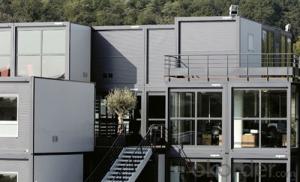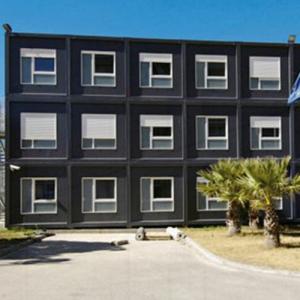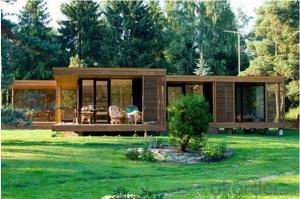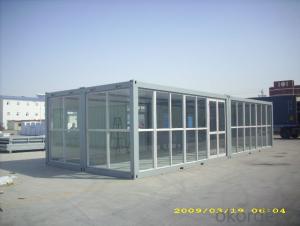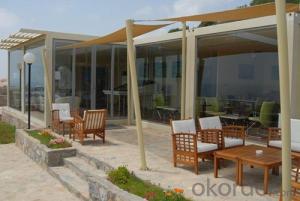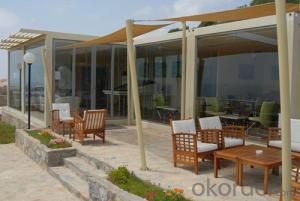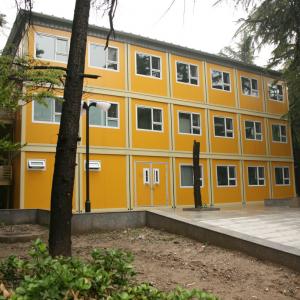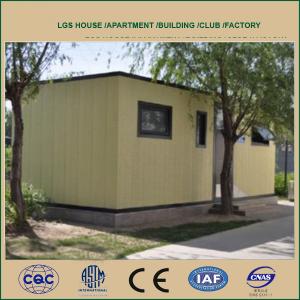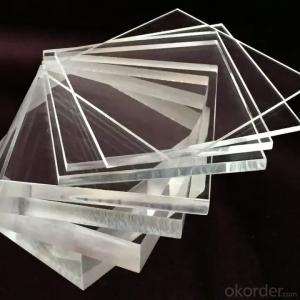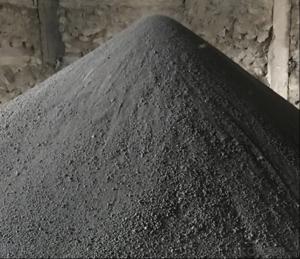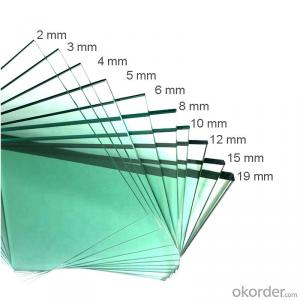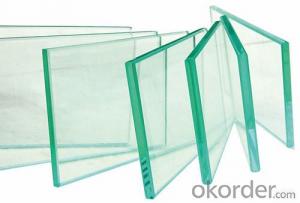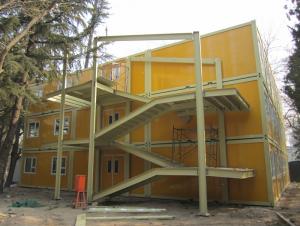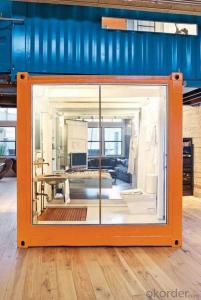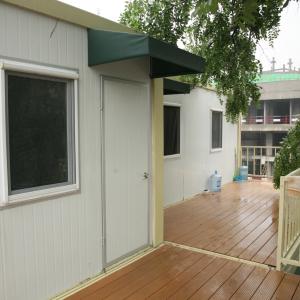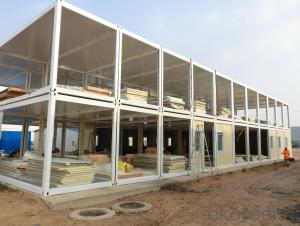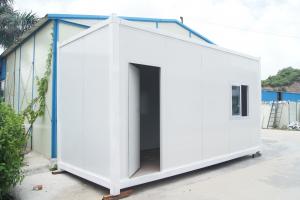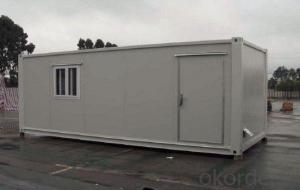Container house made in China
- Loading Port:
- China Main Port
- Payment Terms:
- TT OR LC
- Min Order Qty:
- -
- Supply Capability:
- -
OKorder Service Pledge
OKorder Financial Service
You Might Also Like
Specifications
Container House
Flexibility Design and Nice Appearance
Easy assemble&disassemble
Competitive price with high quality
ISO9001:2008 Certified Modular Container House
Features:
Safty and reliable light steel flexible structural system
Easy to transport, assemble and disassemble, repetitive to use
Good and attractive apperance
Waterproof, soud-insulated, heat preservation, seal, easy to clean and maintenant
Any dimension and customized design are available
Widely modal application, the office, conference room, dormitory, store, factory etc.
Detailed Specification:
They have been retro-fitted with functional container house accessories. These container home units are transportable and comfortable to live in temporarily or permanently.
They are fitted with power and lighting and can be accessorised to suit your requirements.
Container houses are becoming increasing popular in this new age of sustainable living, as our container houses are constructed from recycled shipping containers. We can design a portable container home to your specific needs.
Main material list:
| No. | NAME | ITEMS | |
| WALL & ROOF | |||
| 1 | wall panel | wall panel | 75mm tickness EPS / PU sandwich panel |
| insulation wall panel | 50mm tickness EPS / PU sandwich panel | ||
| 2 | roof panel | interior top board | 75mm tickness EPS / PU sandwich panel |
| 3 | insulation top part | 50mm fibreglass +60mm foam | |
| 4 | exterior top board | 0.5mm thick color coated steel | |
| STEEL FRAME | |||
| 5 | steel frame | column | 2.5mm steel bending |
| 6 | foundation main beam | 3.0mm steel bending | |
| 7 | foundation secondary beam | 2.5mm steel bending | |
| 8 | top framework | 3.0mm steel bending | |
| 9 | channel for forklift | 3.0mm steel bending | |
| 10 | reinforced steel board | 6mm thickness steel borad | |
| 11 | channel for wall panel | 0.8mm stainless steel bending | |
| 12 | corner fitting | special for container house,ISO standard | |
| 13 | corner line for decorate wall edged | 25 anlge aluminum | |
| FLOOR | |||
| 14 | floor | multi-plywood | 2440*1220*18mm |
| 15 | plastic floorboard | 1.5mm thickness, water proof | |
| DOOR&WINDOW | |||
| 16 | DOOR&WINDOW | door | EPS door with aluminum alloy canopy or steel door |
| 17 | window | UPVC/ aluminum sliding window | |
| 18 | window wrap page | aluminum | |
- Q:Can container houses be built with a solar power system?
- Yes, container houses can be built with a solar power system. In fact, container houses are often considered excellent candidates for solar power due to their modular and portable nature. The roof of a container house can be easily equipped with solar panels to harness the sun's energy and convert it into electricity. These panels, made up of photovoltaic cells, can generate electricity during the day and store it in batteries for use at night or during cloudy days. The size of the solar power system will depend on the energy requirements of the container house, but with advancements in solar technology, it is possible to power an entire container house solely with solar energy. Additionally, container houses are often designed with energy-efficient features such as insulation and double-glazed windows, which further complement the use of solar power by reducing energy consumption. Overall, container houses and solar power systems are a perfect match, providing sustainable and environmentally friendly living solutions.
- Q:Are container houses suitable for pet shelters?
- Yes, container houses can be suitable for pet shelters. Container houses offer several advantages that make them a viable option for pet shelters. Firstly, container houses are affordable and readily available, making them a cost-effective solution for pet shelters with limited budgets. Secondly, container houses can be easily modified and customized to meet the specific needs of pet shelters. They can be equipped with insulation, ventilation systems, and plumbing to ensure the comfort and well-being of the animals. Additionally, container houses are durable and weather-resistant, providing a safe and secure environment for the animals. They can withstand extreme weather conditions and are less susceptible to damage from pests. Moreover, container houses are portable, allowing pet shelters to relocate if necessary or expand their facilities as the need arises. In conclusion, container houses offer a practical and efficient solution for pet shelters, providing a safe, affordable, and customizable space for animals in need.
- Q:Can container houses be designed to have a rooftop bar?
- Yes, container houses can be designed to have a rooftop bar. With proper structural modifications and design considerations, containers can be stacked and reinforced to support the weight of a rooftop bar. Additionally, the container's modular nature allows for customization, making it possible to incorporate features like staircases, access points, seating areas, and other amenities that are essential for a rooftop bar experience.
- Q:Can container houses be designed for small businesses or shops?
- Certainly, container houses are capable of being designed to accommodate small businesses or shops. In reality, container houses have become increasingly popular in recent times due to their adaptability and cost-effectiveness. They can be easily transformed into functional spaces suitable for various purposes, including small businesses and shops. Container houses provide several advantages for small businesses and shops. Firstly, they offer a high level of customization, making it simple to modify them to suit specific business requirements. Containers can be equipped with windows, doors, and partitions to create separate areas for retail, storage, and office space. Moreover, they can be stacked or connected to form larger spaces, allowing for future expansion as the business grows. Furthermore, container houses are relatively affordable when compared to traditional brick-and-mortar structures. This cost-effectiveness is particularly advantageous for small businesses and shops with limited budgets. Containers are readily available, and their modular nature reduces construction time and labor costs. Additionally, they can be transported and relocated, making them suitable for temporary or mobile businesses such as pop-up shops or food stalls. Container houses also offer sustainability benefits, aligning with the growing trend towards eco-friendly businesses. Containers are typically constructed from recycled materials, reducing the environmental impact of construction. Additionally, they can be equipped with energy-efficient features such as insulation, solar panels, and rainwater harvesting systems, minimizing energy consumption and promoting sustainability. In conclusion, container houses can indeed be designed and utilized for small businesses or shops. Their versatility, affordability, and sustainability make them an appealing choice for entrepreneurs seeking flexible and cost-effective spaces to establish their businesses.
- Q:Are container houses suitable for pet shelters or rescue centers?
- Yes, container houses can be suitable for pet shelters or rescue centers. They provide a cost-effective and easily customizable solution for housing and accommodating animals. Container houses can be designed to meet specific needs such as insulation, ventilation, and sanitation requirements for animals. Additionally, their modular nature allows for easy expansion or relocation, making them flexible for future growth or changes in location.
- Q:Can container houses be designed with a daycare center?
- Yes, container houses can definitely be designed to include a daycare center. Container houses are modular and customizable, making them versatile enough to accommodate various needs and purposes. With careful planning and design, a container house can be transformed into a safe and functional space for a daycare center. To make a container house suitable for a daycare center, certain considerations need to be taken into account. Firstly, the layout should be designed in a way that allows for separate areas for different activities such as playtime, nap time, and mealtime. The space should also be child-friendly, with appropriate safety measures in place, such as rounded edges, non-toxic materials, and childproof locks. Moreover, adequate insulation, ventilation, and lighting should be incorporated to ensure a comfortable and healthy environment for both children and staff. It is also essential to install proper plumbing and bathroom facilities to meet the specific needs of a daycare center. Additionally, container houses can be expanded by connecting multiple containers together to create a larger space for the daycare center. This flexibility allows for scalability and the ability to accommodate a growing number of children and staff. Overall, container houses can be designed and customized to meet the requirements of a daycare center. With careful planning and attention to detail, container houses can provide a unique and cost-effective solution for daycare providers while maintaining a safe and nurturing environment for children.
- Q:Are container houses suitable for music studios?
- Indeed, container houses can serve as appropriate settings for music studios. The versatility and cost-effectiveness of these dwellings have contributed to their increasing popularity. They can be easily modified and customized to cater to specific requirements, rendering them ideal for a multitude of purposes, including music studios. Container houses furnish a robust and soundproof environment, a crucial aspect for any music studio. The steel walls of these containers furnish exceptional insulation against external noise, guaranteeing that sounds produced within the studio do not disturb the surroundings, and vice versa. Moreover, containers can be effortlessly equipped with suitable insulation materials, such as acoustic foam panels or soundproof glass, to further enhance the audio quality within the studio. Consequently, musicians and producers can compose and record music without unwanted external noises or disturbances. Furthermore, container houses can be conveniently expanded or combined to create larger studio spaces, accommodating multiple recording rooms, control rooms, and even lounges or waiting areas. This adaptability permits future growth and the capacity to adjust to evolving needs. Container houses also prove cost-effective when compared to conventional construction methods. They are easily accessible, and their modular nature simplifies the construction process, reducing both time and expenses. As a result, musicians and artists with limited budgets can acquire their own professional spaces for music production and recording. All in all, container houses offer a pragmatic and efficient solution for music studios. They bestow soundproofing, flexibility, and cost-effectiveness, rendering them a suitable choice for musicians, producers, and anyone seeking to create a professional music environment.
- Q:Are container houses suitable for earthquake-prone areas?
- Container houses can be suitable for earthquake-prone areas if they are properly designed and reinforced to withstand seismic activity. However, additional structural modifications and reinforcements may be necessary to ensure their stability and safety during earthquakes.
- Q:Can container houses be built off-grid?
- Indeed, it is possible to construct container houses that operate independently from public utilities, a concept known as off-grid living. Container houses can be customized and engineered to adhere to the criteria of off-grid living. To achieve an off-grid container house, a range of systems can be implemented. Installation of solar panels on the roof enables the generation of electricity, which can then be stored in batteries for use during cloudy days or at night. Additionally, a rainwater harvesting system can be established to collect and store rainwater for daily use, thereby reducing reliance on municipal water supplies. These container houses can also integrate composting toilets or septic tanks to manage waste, eliminating the need for a connection to a sewage system. Greywater recycling systems can be employed to treat and recycle wastewater from sinks, showers, and washing machines, effectively minimizing water consumption. Moreover, optimization of insulation and ventilation is crucial for maintaining a regulated interior temperature, thereby reducing the necessity for heating or cooling systems. This can be achieved through the utilization of energy-efficient windows, insulation materials, and natural ventilation techniques. Container houses possess adaptability and can be constructed in remote locations, making them ideally suited for off-grid living. With appropriate modifications and the implementation of requisite systems, container houses can offer a sustainable and self-sufficient living solution.
- Q:Can container houses be designed with a multi-unit complex?
- Indeed, it is possible to design container houses as a multi-unit complex. The versatility of container houses allows for easy stacking and arrangement in different configurations, enabling the creation of apartment buildings, dormitories, or small housing communities entirely composed of container houses. Container houses are constructed using shipping containers, typically 20 or 40 feet long. These containers can be stacked vertically or placed side by side to form multiple levels or adjacent units. By modifying and connecting the containers, larger living spaces, common areas, and shared facilities can be created. Furthermore, container houses can be customized to cater to the specific needs and preferences of the residents. They can be designed with various layouts, sizes, and amenities. For instance, a multi-unit complex can include units of different sizes, ranging from studios to larger family-sized containers. The containers can also be interconnected to establish shared spaces like kitchens, bathrooms, laundry facilities, or community areas. Container houses offer several advantages for multi-unit complexes. Compared to traditional construction methods, they are cost-effective as available containers can be repurposed for housing. Moreover, they are environmentally friendly, reducing waste by utilizing existing containers and promoting recycling. Additionally, container houses can incorporate sustainable features like insulation, solar panels, or rainwater harvesting systems, making them energy-efficient. To conclude, container houses can certainly be designed as a multi-unit complex. Their flexibility, affordability, and sustainability make them an appealing choice for creating distinctive and innovative housing solutions for various populations and needs.
1. Manufacturer Overview |
|
|---|---|
| Location | |
| Year Established | |
| Annual Output Value | |
| Main Markets | |
| Company Certifications | |
2. Manufacturer Certificates |
|
|---|---|
| a) Certification Name | |
| Range | |
| Reference | |
| Validity Period | |
3. Manufacturer Capability |
|
|---|---|
| a)Trade Capacity | |
| Nearest Port | |
| Export Percentage | |
| No.of Employees in Trade Department | |
| Language Spoken: | |
| b)Factory Information | |
| Factory Size: | |
| No. of Production Lines | |
| Contract Manufacturing | |
| Product Price Range | |
Send your message to us
Container house made in China
- Loading Port:
- China Main Port
- Payment Terms:
- TT OR LC
- Min Order Qty:
- -
- Supply Capability:
- -
OKorder Service Pledge
OKorder Financial Service
Similar products
New products
Hot products
Related keywords
